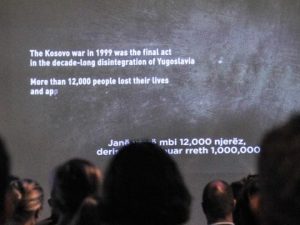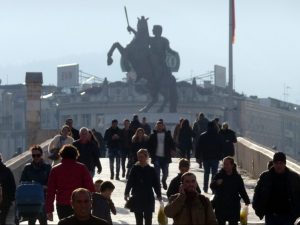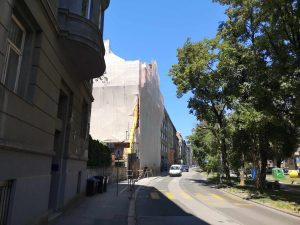By Ivana Jeremic
From exposing corruption and human rights violations to uncovering war crimes and tracking disinformation, BIRN has consistently held power to account – often while facing intimidation, smear campaigns, and legal threats.
From 2005 onwards, BIRN has expanded its work across more than 17 countries, building a network of reporters, editors, researchers and media partners. BIRN journalists have uncovered cross-border criminal networks, tracked disinformation campaigns, and reported on key issues shaping public life across the Balkans and Central Europe.
BIRN’s Transitional Justice programme has earned global recognition for its efforts to document the legacy of the 1990s conflicts and promote truth and accountability. Our Reporting Democracy programme expanded our coverage to include Central Europe, highlighting how political trends connect across the region. Our Digital Rights programme has become a trusted source of reporting on how technology is affecting rights and freedoms online.
As we celebrate 20 years of investigative journalism, here are some of the most significant stories we’ve produced over the years.
Ex-Policemen Run Kosovo Passport Scam
A BIRN cross-border investigation in 2007 uncovered a booming black market for illegally obtained personal documents and passports in Kosovo, Serbia, and Montenegro – one that used the bureaucratic challenges faced by many Kosovars seeking to travel abroad. While legal channels were slow and often inaccessible, a network of mediators and former police officers offered expedited services for hefty fees, supplying forged or fraudulently obtained Yugoslav-era documents that are still valid in parts of the region.
The investigation revealed that these intermediaries, many of them ex-policemen, use long-standing ties with Serbian municipal offices to bypass legal requirements. Despite Serbian law mandating in-person applications, mediators were able to secure full sets of documents – including birth certificates, citizenship papers, IDs, and passports – within days.
Montenegro, especially the town of Rozaje, played a critical role in this illicit trade, serving as a discreet meeting point and operational hub. Here, former police officials used old networks and institutional connections to provide services to both Albanians and Serbs, despite the legal risks and Serbia’s post-Yugoslav administrative restrictions.
Making a Killing: The 1.2 Billion Euro Arms Pipeline to Middle East
In this multiple award-winning cross-border investigation, BIRN and OCCRP uncovered a vast, largely hidden arms pipeline from Central and Eastern Europe to the Middle East, fuelling the conflicts in Syria and Yemen. Over just 13 months, at least 68 cargo flights – one notably from Belgrade in November 2015 – transported weapons and ammunition to Saudi Arabia and Turkey, which then funnelled them into war zones. This arms flow was part of a larger 1.2-billion-euro trade in weapons from eight Balkan and Eastern European countries since 2012, coinciding with the militarization of the Arab Spring uprisings.
The investigation, based on arms export data, flight records, contracts, and UN documents, revealed that weapons – including assault rifles, rocket launchers, and heavy machine guns – originated from Bosnia, Bulgaria, Croatia, the Czech Republic, Montenegro, Romania, Serbia, and Slovakia. These arms, often approved for export under official licenses, were then diverted to groups accused of serious human rights violations, in potential breach of the UN Arms Trade Treaty and international law.
Despite the massive human toll of these conflicts the arms trade remains highly profitable and largely unregulated. Arms experts and human rights organisations, including Amnesty International, asserted that this diversion of weapons was almost certainly illegal. Yet the trade persisted, driven by political interests, powerful arms industries, and covert coordination involving the CIA, Turkey, and Gulf states, often bypassing formal oversight mechanisms.
‘The Unidentified’: Documentary Film
BIRN’s feature-length documentary ‘The Unidentified’, which premiered in 2015, revealed the untold story behind the brutal atrocities committed during the Kosovo war, told from the perspective of the victims and of the commanders who ordered the attacks.
During their campaign in Kosovo, Serbian forces committed some of their worst crimes in the town of Peja/Pec and surrounding villages. Women, children and elderly people were driven out of their homes, while men were murdered and their bodies burned or buried in mass graves.
Many of the commanders who ordered the attacks continued to live free in Belgrade. ‘The Unidentified’ named these officers and poses the question of whether, nearly two decades after the war, justice could finally be done.
The film won the Best Short Documentary award at the South East European Film Festival in 2016. It was screened at seven film festivals in 2016, and at ten debates and lectures. The film has reached an estimated one million people via its broadcasts on Al Jazeera Balkans.

ISIS Holding Albanian Children ‘Hostage’ in Syria
Dozens of Albanian children were stuck in Syria during the war there, held by radical Islamist groups that refused to allow their return. BIRN’s investigation revealed that from 2012 to 2014, a total of 13 Albanian women and 31 children were taken to Syria by jihadist fighters who joined groups like the so-called Islamic State (ISIS) and al Qaeda. Many of the children have been orphaned after their fathers were killed in combat, and at least 23 of them are minors.
One high-profile case involved Eva and Endri Dumani, ages nine and seven, whose father Shkelzen Dumani took them to Syria without the mother’s consent. Dumani, under surveillance by Albanian intelligence at the time, was able to smuggle the children out of the country with the illegal assistance of two police officers. He later died in battle fighting for ISIS, and the children remained in ISIS-controlled territory, unable to return.
The Albanian government faced criticism for failing to prevent jihadists from taking children abroad and for the involvement of law enforcement in facilitating illegal departures. Meanwhile, several families, including grandparents, were trapped in ISIS camps, waiting for permission to leave with the orphaned children.
True Cost of ‘Skopje 2014’ Revealed
The grand urban renewal initiative known as ‘Skopje 2014’ began in 2010 with the promise of transforming North Macedonia’s capital through the addition of roughly 40 monuments, sculptures, facades, and public buildings. Initially, the government announced the project would cost around 80 million euros.
However, by 2015, the scale and cost of the project had dramatically escalated. A BIRN investigation revealed that the total expenditure had ballooned to approximately 560 million euros – seven times the original estimate – while the number of new structures and monuments had more than tripled.
The findings were based on an eight-month investigation by BIRN, which used documents obtained through the Access to Public Information Act, public procurement data, audits, and reports from various levels of government. The investigation showed a pattern of repeated funding awards to the same entities, raising concerns about transparency, accountability and the potential misuse of public funds.
Ivanovic Named Radoicic as North Kosovo Dark Ruler
In his final interview with BIRN before his assassination in January 2018, prominent Kosovo Serb politician Oliver Ivanovic named Milan Radoicic as a central figure in a shadowy, informal power structure operating in northern Kosovo. Ivanovic, who was increasingly critical of Belgrade-backed influence in the region, said real authority did not lie with elected institutions but with individuals like Radoicic, a businessman and alleged enforcer with close ties to Serbia’s ruling party.
Although Ivanovic asked for this part of the interview to remain off the record out of fear of retaliation, he insisted the journalist remember Radoicic’s name. He expressed deep concern that Serbian President Aleksandar Vucic had publicly praised Radoicic as a protector of Serbs in Kosovo, calling this “horribly worrying.”
Ivanovic was gunned down outside his party’s offices in Mitrovica, after previously reporting threats against him and his family to authorities in both Kosovo and Serbia. Court proceedings were subsequently launched for the murder, but Radoicic, who fled to Serbia, was not indicted.
In Albania, a Worrying Rise in Drug Gangs Hiring Minors
BIRN’s investigation revealed evidence that a growing number of minors in Albania were being exploited by drug gangs to distribute their illegal products. Experts and officials said criminal groups are targeting minors from poor families, knowing that even if they are caught, if they are able to prove they are using the drugs themselves, they are unlikely to face heavy penalties.
Between 2018 and 2021, the number of minors investigated or arrested on drug-related charges almost doubled, according to police data seen by BIRN. Several cases investigated by the authorities show that crime groups use minors to steal, pay them in cannabis and then exploit their dependency and need for money to recruit them as distributors of drugs.

Serbia Under-Reported COVID-19 Deaths and Infections, Data Shows
As restrictive COVID-19 measures provoked mass protests in Serbia, BIRN reported in June 2020 that from March 19 to June 1 that year, a total of 632 people died in the country after testing positive for COVID-19, more than twice the official figure of 244.
By analysing data obtained from the state’s own COVID-19 information system, BIRN also reported that the number of people infected in Serbia from June 17 to June 20 was at least 300 per day, far more than the official numbers which at their highest reported 97 new cases in a single day.
The story contributed to rising public frustration over the government’s handling of the pandemic, erupting in protests in July after the government – having lifted the lockdown ahead of a June 21 election – tried to re-impose stricter measures. The opposition accused the ruling Progressive Party of hiding the real numbers in order to hold an election that it won in a landslide.
However, in September, after months of denial, a member of the Serbian government’s Crisis Staff conceded that, up till June, the number of deaths related to COVID-19 and officially announced by the government was three times lower than the real number.
BWK: The Armed Afghan Gang Terrorising Migrants, Refugees Crossing Bosnia
A recent investigation exposed the brutal rise of an armed Afghan gang, known as BWK, operating in Bosnia and Herzegovina. Amid tightening European borders and unstable smuggling profit, the group turned to kidnapping asylum seekers and demanding ransoms from their families. Victims reported being abducted, starved, beaten, and tortured for days while captors request payments, often through videos sent to relatives.
BWK emerged in 2023, gaining control over key migrant routes along Bosnia’s borders with Montenegro and Croatia. Their operations are sophisticated, and involve international money transfers, fake identities, and tip-offs from insiders in refugee camps. Some members hold valid European ID documents, allowing them to move freely.
Irish Dream Turns to ‘Nightmare’ for Eastern European Seasonal Workers
A joint four-month investigation by BIRN and Irish outlet Noteworthy revealed troubling working conditions faced by migrant labourers, primarily from Eastern Europe, employed in Ireland’s soft fruit and mushroom industries. Despite higher wages compared to their home countries, workers from countries like Bulgaria described their time picking fruit for major companies as gruelling, with poor working conditions.
Documents and data obtained through Freedom of Information requests showed the horticulture sector in Ireland struggled with worker retention due to poor conditions.
‘I Was Powerless’: Serbian Women Detail Devastating Impact of Revenge
This investigation into ‘revenge porn’ in Serbia discovered 16 Telegram groups that posted explicit photos and videos of women without their consent.
Coupled with months of monitoring of Telegram groups and data from police and prosecutors, the picture that emerged was one of systematic failure on the part of the Serbian legal system to protect the victims of revenge porn, a form of gender-based violence. Victims were being exposed to blackmail, public shaming and emotional trauma, and only a few had the resources to fight back.
After the investigation was published, the Telegram group Oralna podrška (Oral Support), with over 50,000 members – one of the largest Serbian Telegram groups that shared women’s intimate photos and videos, as well as porn content – was removed. Twelve other groups that published revenge porn were also closed.
‘Who Benefits?’ Inside the EU’s Fight over Scanning for Child Sex Content
This investigation uncovered a web of influence in the powerful coalition aligned behind the European Commission’s proposal to scan material online for child sexual abuse – a proposal that some experts said puts rights at risk and will introduce new vulnerabilities by undermining encryption.
The regulation would obligate digital platforms – from Facebook to Telegram, Signal to Snapchat, TikTok to clouds and online gaming websites – to detect and report any trace of child sexual abuse material, CSAM, on their systems and in their users’ private chats. It would introduce a complex legal architecture reliant on AI tools for detecting images, videos and speech – so-called “client-side scanning” – containing sexual abuse against minors and attempts to groom children.
While welcomed by some child welfare advocates, it was met with alarm by privacy advocates and tech specialists who said it could unleash a massive new surveillance system and threaten the use of end-to-end encryption. Following the investigation, an inspection by the European Ombudsman identified oversights in the way European police agency Europol handled a move into the private sector by two former officials working on cybercrime.
Skipping the Queue: The Corruption of Cancer in Moldova’s Health System
Exploring systemic corruption in Moldova’s healthcare system, especially in cancer care, the investigation showed how graft continues to flourish despite public scandals.
In 2023, senior doctors at the Oncological Institute in Chisinau were detained for demanding bribes for free medical services. The case highlighted the slow pace of justice and ongoing exploitation of vulnerable patients in Moldova’s healthcare sector.
A court found that one of the doctors, a breast cancer surgeon, had received bribes to enable some patients to bypass the waiting list to receive medical consultations and appointments for consultations and surgeries. But BIRN’s investigation showed that the surgeon continued to work in several private medical clinics after voluntarily retiring from the Oncological Institute.
Bosnian Serb Military Police Chiefs Never Charged with Srebrenica Killings
This investigation used survivors’ testimonies, official documents and Hague Tribunal verdicts from trials from the Srebrenica massacres to show how – despite strong evidence that three Bosnian Serb military police units were involved in capturing Bosniaks from Srebrenica and escorting them to mass execution sites – their commanders were never charged.
Survivors told BIRN how they escaped from the mass executions in July 1995, which were classified as genocide by international courts, and identified their persecutors. The article was one of a series by BIRN Bosnia and Herzegovina journalists that won second prize in the ‘Outstanding Contribution to Peace’ category in the Fetisov Journalism Awards 2021.
Drugs, Diamonds and Bullets: Balkan Arms Firm Linked to Criminal Investigations
The Montenegrin government secretly sold its major defence company, Montenegro Defence Industry (MDI), for just 680,000 euros to a consortium of Israeli and Serbian firms linked to businessmen under criminal investigation. The buyers included CPR Impex, owned by Petar Crnogorac, and Israeli firm ATL Atlantic Technology Ltd, which has ties to Serge Muller, a Belgian arms and diamond dealer wanted by Belgian authorities on drug trafficking, money laundering and organised crime charges.
Muller, known for controversial involvement in blood diamond trading and supplying weapons during Sierra Leone’s civil war, was arrested shortly after the sale ceremony. Meanwhile, Crnogorac faces investigations for abuse of office in military tenders.
The MDI privatisation raised serious concerns about corruption, illegal arms trafficking and the opaque dealings that allowed a strategically important defence company to be transferred into the hands of figures entangled with illicit activities.

‘Kuksa’: The Psychiatric Hospital Feared by Croatian Children in State Care
First-hand accounts collected by BIRN revealed that children in state care in Croatia are often hospitalised for psychiatric treatment unnecessarily, sometimes as a form of discipline rather than for genuine medical need.
Several former residents of children’s homes shared their experiences of being sent to the Psychiatric Hospital for Children and Youths in Zagreb, known locally as ‘Kuksa’. Many described the hospital as a frightening place with restrictive conditions like barred windows and surveillance cameras. Some reported being forcibly medicated, while others spent time there despite showing no aggressive behaviour.
How to Buy an EU Citizenship
This investigation revealed how fraudsters manipulated the citizenship process in Romania by producing genuine-looking documents for fake applicants, enabling them to obtain Romanian passports – and with them, access to the European Union job market. People like ‘Vladimir’, who claimed to be the great-grandson of Soviet leader Stalin, can gain Romanian citizenship through networks of brokers and complicit bureaucrats in Bucharest and Chisinau.
Since Romania passed a law allowing foreign nationals of Romanian descent to apply for citizenship, over 225,000 Moldovans have sought Romanian citizenship, especially after Romania joined the EU in 2007. For many Moldovans, a Romanian passport is a valuable ticket to work and travel freely within the EU, as Moldova remains one of Europe’s poorest countries. However, this demand has also opened the door to corruption and fraud, with networks exploiting loopholes to expedite or fake citizenship claims.
Greeks Take Health into Their Own Hands
Greece’s prolonged financial crisis severely weakened its public healthcare system, leaving many citizens without adequate medical care. People like Vasiliki Katsoula, who lost her job and health insurance, are forced to ration medications between family members, cut pills to adjust dosages, or go without treatment altogether. Her family lives mostly off her father’s reduced pension, but still struggles to afford essential medicines. This desperate improvisation has become commonplace, especially among the uninsured, many of whom turn to volunteer-run “solidarity clinics” for help, where doctors report seeing patients taking incorrect or shared medications due to financial hardship.
There is also a growing trend in Greece for people to bypass formal healthcare and embrace over-the-counter alternatives. Years of deep budget cuts have left millions uninsured or underinsured, increasing out-of-pocket costs and forcing citizens to make dangerous compromises while looking after their health.
‘It Must be a Mistake’: No End in Sight to Turkey’s Global Vendetta
This investigation examines the aftermath of the failed coup attempt in Turkey in July 2016, and President Recep Tayyip Erdogan’s subsequent crackdown on the network run by his exiled archfoe, Fethullah Gulen. Suspects have been forcibly returned to Turkey from dozens of different countries. Some have arrived via approved extradition requests, others by capture and rendition.
Prominent cases include seven Turkish teachers in Moldova and six in Kosovo in 2018. Many other Turkish citizens, including teachers and school directors at Gulen-run schools around the world, live in fear of being captured. Turkey’s campaign of intimidation, harassment, extradition and abduction has been expanded to anyone deemed hostile to the government in Ankara. The authorities call Gulen’s supporters terrorists – and put them on trial as such. Although Gulen later died, Turkey’s hunt for his sympathisers continued.
‘Foreign Ideology’: Poland’s Populists Target LGBT Rights
This investigation looks at how the government led by Poland’s Law and Justice (PiS) party shifted its political focus from vilifying refugees to targeting the LGBTQ+ community to mobilise its conservative voters ahead of the 2019 elections. The party frequently portrayed LGBTQ+ rights as a threat to traditional Polish values and Catholic norms.
Its political strategy intensified public hostility toward LGBTQ+ people, as seen in the city of Rzeszow when PiS city councillors tried to ban the Equality Parade because it ‘promoted a dangerous ideology’. The parade went ahead under police protection but was marred by hostility, with far-right counter-protests and masked men hurling eggs.
The attempt to suppress LGBTQ+ events is part of a broader pattern. In several cities, local officials – often backed by PiS – tried to outlaw Equality Parades, sometimes citing security concerns or perceived moral threats. While courts overturned these bans, the political pressure and public discourse became increasingly hostile.
